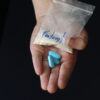Quick Hits: A new study is questioning the use of antipsychotics in children and young adults for mental health conditions other than psychosis, as doing so raises the risk of unexpected death. Researchers examined data from about 250,000 children and young people (ages five to 24) in Tennessee’s Medicaid program. Some children were given low or high doses of an antipsychotic for conditions such ADHD (attention-deficit/hyperactivity disorder) or depression, while a comparator group took medication that wasn’t antipsychotics. Those in the high-dose antipsychotic group had a 3.5 times higher risk of unexpected death compared to the group taking other medications. The study authors said the results reinforce guidelines for cautious use of antipsychotics in younger populations. Posted December 12, 2018. Via JAMA Psychiatry.
Quick Hits: Fentanyl is the deadliest drug in the US, based on overdose deaths. More than 18,000 people overdosed on the synthetic opioid in 2016, according to a new report. Heroin and cocaine rounded out the top three. The report, put out by the National Center for Health Statistics, part of the CDC, noted how fentanyl’s share of overdose deaths has grown in recent years. In 2011, fentanyl was responsible for 4% of overdose deaths. In 2016, that figure jumped to 29%. Other opioids that made the top 15 overdose list were morphine, Oxycontin (oxycodone) and Vicodin (hydrocodone). Valium (diazepam) and Klonopin (clonazepam), anti-anxiety drugs known as benzodiazepines, were also on the list. Posted December 12, 2018. Via National Center for Health Statistics.
Quick Hits: Many older adults who receive a prescription for an antidepressant from their primary care doctor take the meds inconsistently or not at all. In a study involving 1,500 adults aged 60 and older, about 14% didn’t start taking their medication within two weeks of receiving a prescription. Among those who did start taking their antidepressant, 37% stopped taking it within a year. Adults who experienced side effects were 22% more likely to unreiably take their medication or stop taking the drug altogether. And those with other mental illnesses were about 60% more likely to take an antidepressant inconsistently or stop taking it. Posted November 5, 2018. Via Family Practice.






